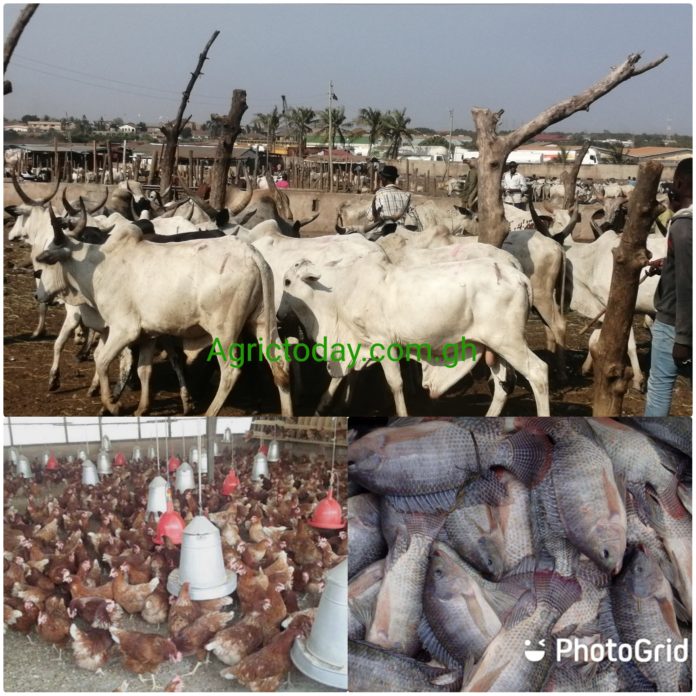Last year 2019, The President, Nana Addo Dankwa Akufo-Addo, launched the Rearing for Food and Jobs (RFJ) programme in Wa in the Upper West Region.
The programme, which involves the distribution of livestock to selected farmers for rearing spans the period 2019-2023 and is meant to develop a more competitive and efficient livestock industry which will increase domestic production, create jobs, and reduce the importation of meat products.
In his remarks the president lamented the fact that for the past 20 years’ animal rearing had dwindled in the country, resulting in Ghana spending more than $400 million annually to import meat products, as 81 percent of the meat consumed in the country was imported.
For that reason, the President said, various strategies had been employed to sustain the programme, including the supply of improved breeding livestock, the development and conservation of feeding grounds and water resources, improvement in livestock extension services and farmer education and disease control and surveillance to avert any unforeseen disasters.
To supplement the government’s effort and contribute its quota as a primary stakeholder in the agric industry, Agri-house Foundation introduced the Livestock, Poultry and Fisheries, Training & Trade Show last year in Accra.
The event was held alongside the hugely impactful All Africa Conference on Animal Agriculture (AACAA).
The organizers believe that the event creates that missing platform where livestock, poultry, and fisheries farmers can share experiences and have their common concerns addressed.
The LiPF initiative further showcases and promotes the livestock, poultry, and fisheries production value chain and job opportunities through exhibitions. It also offers free training programmes in Animal production and best practices to interested persons.
It was created to close the gap that had existed between the livestock and crop sectors in the Ghanaian agricultural industry. This is in acknowledgment of a Food and Agriculture Organization (FAO) report which posits that Livestock production contributes about 40% of the global value of agricultural output and supports the livelihoods and food and nutrition security of almost 1.3billion people in the world.
The report further states that in Ghana, the livestock sector contributes an average of 7% to the agricultural Gross Domestic Product (GDP) of the country.
This year’s edition of the LiPF is slated for 24th -25th September and will seek to help people identify the opportunities present in the livestock, poultry and fisheries sector and how to harness this opportunity for the creation of jobs, reduction in unemployment and growth of the Ghanaian economy.
The LiPF initiative showcases and promotes the livestock, poultry and fisheries production value chain and job opportunities through exhibitions. It also offers free training programmes in Animal production and best practices to interested persons.
The initiative also seeks to encourage farmer groups and livestock farmers to deliberate on the potentials present in animal agriculture and ways to improve the sector, promote and identify opportunities in the Livestock, Poultry, and Fisheries Sector and encourage people to venture into animal agriculture and the career opportunities it offers.
The event theme this year- ’Step-up, underscores the need for stakeholders to collectively step-up efforts geared towards improved productivity for the subsector.
Last year, the event had in attendance about 1,376 participants from Ghana and other countries like Nigeria, Kenya, Ethiopia, Egypt, United Kingdom, Netherlands, etc, and over 62+ Exhibitors throughout the two (2) day event.
The two-day event will see participants taken through sessions on Introduction to livestock, fisheries, and Poultry as Business, Livestock, fisheries and Poultry (animal agriculture) and the Business Environment – legal, taxation, Access and appraisal for obtaining credit or loan, Value chain optimization, Introduction to Cattle Farming, Guidelines for setting up a cattle farm, Production/inputs/Health, Processing and Marketing, Introduction to Rabbit Farming, Requirements of setting up a rabbit farm and more.
Training Sessions on Introduction to Cat Fish Farming, Cat Fish production in Ghana, starting a fish farm – Requirements, Requirements of setting up a Small Ruminant farm, Small scale Poultry Processing and the Nitch market, etc., Poultry Financing, Poultry Market Development and Profitability, Requirements of setting up a Pig farm, Requirements of setting up a Snail farm, Biosecurity among other insightful topics.
The event will climax with the Launch of Africa Women in Animal Resource Farming and Agribusiness – Network (AWARFA-N), a food bazaar dubbed “The LIPF FOOD BAZAAR “, Closing Ceremony, and Presentation of Exhibition/Participant Certificates.
The exhibition component of the event will provide participating firms with an opportunity to advertise their wares and products.
On the second day, participants would be trained and engaged by industry experts on
Poultry management and production, participants would get to ask questions and get answers, there would also be a Fisheries and Aquaculture Training Session, where fish farmers would be advised and trained on the best types of fish to grow for the Ghanaian market, management options, feed and distribution options. The exhibitions would be held concurrently with the event.
The events programme line-up includes a Break-out business Session on (Piggery, cattle, rabbit, fish, grass-cutters, and poultry) where farmer groups would be split into different groups with a mentor for each group to encourage one-on-one communication and advice from experts to livestock farmers and those who want to venture into the business, with exhibitions running simultaneously.
To create a legacy towards the realization of Ghana beyond the Aid Agenda, it is important to harness the potential of the poultry and livestock subsectors. Already the revenue clout of the two areas is conspicuous and must be fully capitalized on.
Aside from the benefit of a diversified revenue base for Ghana, the livestock sector has the potential to provide a solid raw material base for industrialization will also help develop rural economies and support the structural transformation of the economy.
Agriculture is an important contributor to Ghana’s export earnings, and a major source of inputs for the manufacturing sector today. It is also true that we are yet to see the seismic impact that we are capable of. This event provides a fantastic opportunity for stakeholders to push the livestock and poultry sectors farther and further close to its potential. The success stories from the continent and elsewhere points to a bright future for Ghana if we follow through with plans to give other non-traditional products a genuine chance to compete for traditional products that have enjoyed the lion’s share of attention in the form of financing and training.
Participants are expected from Industry Players like Scientists, Government Institutions, Financial Institutions, Development Partners, Technology Firms, Processing, and Packaging Companies, Value Chain Actors, Associations, the Media, and Tertiary Institutions who will have the opportunity to promote and showcase their brands, Network and engage with experts and leading minds, Identify and explore opportunities, Understand the animal agriculture industry and opportunities within the value chain, Be trained and start a career in the livestock value chain sector.
The input of stakeholders like the: Ministry of Food & Agriculture, USDA- Ghana Poultry Project, the livestock breeders, and traders association, National Farmers & Fishermen Award Winners’ Association, Central region fishermen and fishmongers association, and Nyonkodo Farmers Association is set to make the event even more impactful this year.








